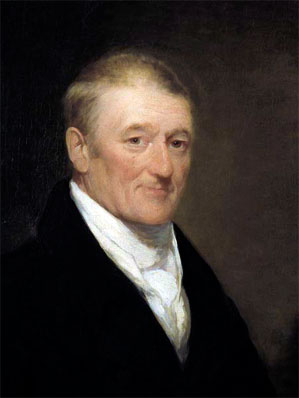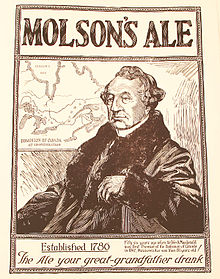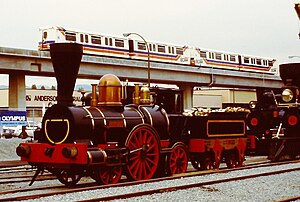John Molson
1763 - 1836
John Molson was the eldest of five children of John Molson Sr. and Mary Elsdale. Molson
was an orphan by the age of eight: his father had died in 1770, his mother in 1772.
Molson was left to the care of his grandfather, who rented out the family estate,
Snake Hall, and used the money to pay for Molson's care and education and paid
Molson's eventual inheritance.
At the age of 17, Molson suffered from an unknown illness. His doctor recommended time
at sea to help restore his health. Molson decided to sail to Canada, which he viewed as
a land of opportunity. His grandfather objected, but his uncle, renowned privateer
Robinson Elsdale, encouraged him. He set sail for Quebec on 2 May 1782. Rough seas and
a delinquent captain forced Molson to abandon his original ship and complete the
journey on a British navy vessel. He ultimately arrived safely in Montreal in late
June or early July.
In Montreal, John Molson connected with Thomas Loid, a family friend from England. Loid
had set up a small brewery on the banks of the St. Lawrence, on the outskirts of
Montreal. Historically, beer was not popular in the city. In the wake of the American
Revolutionary War, however, an influx of Loyalists and a garrison of British troops

increased demand for beer. Recognizing an opportunity, Molson partnered with Loid in
1783, using money from his inheritance. Their partnership would not last long. A year
later, Molson sued Loid for an outstanding debt. He was eventually awarded full control
of the brewery and bought most of its assets in an auction later that year. The lawsuit
was probably a way to transfer ownership to Molson while avoiding creditors. Molson may
have continued to live with Loid throughout the proceedings, and Molson and his
associates were the only people to bid on the brewery's assets.
In 1785, Molson returned to England to settle his estate. While there, he acquired the
book Theoretic Hints on an Improved Practice of Brewing Malt‐Liquors by John
Richardson, which he read on the return voyage in the spring of 1786. With his new
found knowledge and full inheritance, he expanded the brewery in 1787. As the only local
brewery, Molson's quickly proved popular and profitable. Its fortunes grew further
after 1789, when the French Revolution and subsequent unrest in Europe virtually cut
off the international supply of beer. In 1795, Molson expanded again and began producing
54,000 gallons of ale, beer and spruce beer annually.
By 1791, John Molson turned his attention to many other businesses and causes. Most
notably, he and two business partners brought steamships to Canada. On 1 November 1809,
he launched the Accommodation, which ran on the St. Lawrence from Montreal to Quebec
City. He expanded his fleet steadily, eventually running a monopoly on steam travel
along the St. Lawrence, the Ottawa River and the Rideau Canal. Molson later helped
fund Canada's first railroad, but he died before it was completed.

The success of the steamship service led him to build a hotel and wharf on the Montreal
waterfront. The Mansion House Hotel was the centre of Montreal society until it burned
down in 1821. Its replacement was seen as the grandest hotel in Canada until it also
burned down in 1832. In 1825, Molson helped found the Theatre Royal, which brought
international performers to Montreal.
Motivated by problems he had securing permission to build the wharf and a desire to
represent the interests of Quebecers, Molson entered politics in 1816. He served in
Lower Canada’s House of Assembly until 1820, when he did not seek re-election. He
became president of the Bank of Montreal in 1826 and served as chair of the Montreal
General Hospital in 1831. Molson also provided significant capital to Montreal General.
In 1832, he was appointed to the Legislative Council, an advisory board that served
the governor general, Lord Aylmer. A seat on this council was among the most powerful
political positions in the country at the time.
In December of 1835, Molson caught a high fever. He wrote his will on 11 January 1836,
and died that day. In his will, Molson named John Molson junior, Thomas Molson, William
Molson, George Moffatt and Peter McGill executors. His remains now rest in a family
mausoleum at Mount Royal Cemetery.
Worshipful Brother Molson was a member of St. Paul's Lodge and served as Worshipful
Master from June 1791 to December 1791 and from June 1795 to June 1796.
Molson was also appointed Provincial Grand Master of the District Grand Lodge of
Montreal by the Duke of Sussex by Letters Patent dated 15 May 1826 and installed in
office by Claude Dénéchau on September 5, 1826; Molson resigned in 1833.




 after 1789, when the French Revolution and subsequent unrest in Europe virtually cut
off the international supply of beer. In 1795, Molson expanded again and began producing
54,000 gallons of ale, beer and spruce beer annually.
after 1789, when the French Revolution and subsequent unrest in Europe virtually cut
off the international supply of beer. In 1795, Molson expanded again and began producing
54,000 gallons of ale, beer and spruce beer annually.

 The success of the steamship service led him to build a hotel and wharf on the Montreal
waterfront. The Mansion House Hotel was the centre of Montreal society until it burned
down in 1821. Its replacement was seen as the grandest hotel in Canada until it also
burned down in 1832. In 1825, Molson helped found the Theatre Royal, which brought
international performers to Montreal.
The success of the steamship service led him to build a hotel and wharf on the Montreal
waterfront. The Mansion House Hotel was the centre of Montreal society until it burned
down in 1821. Its replacement was seen as the grandest hotel in Canada until it also
burned down in 1832. In 1825, Molson helped found the Theatre Royal, which brought
international performers to Montreal.
